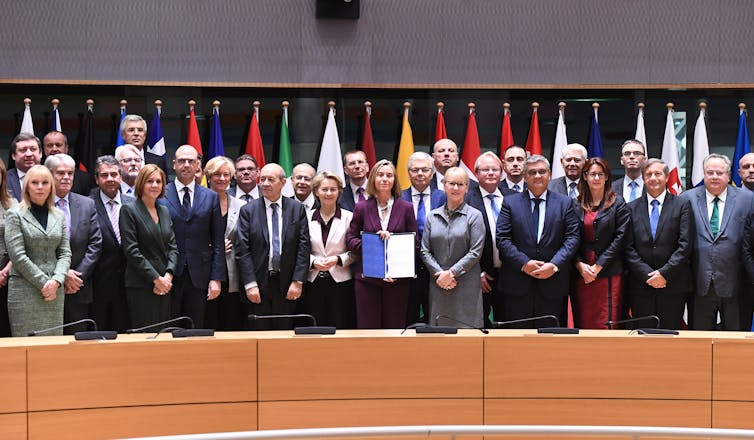A group of 25 EU member states has adopted a new agreement establishing what it is calling the European permanent structured cooperation on defence. Known in Brussels circles as PESCO, the deal will see these countries seriously committing to develop joint military capabilities and technologies. They will regularly increase defence budgets to produce and acquire shared equipment. They will also invest on a number of projects seeking to harmonise national military forces and enhance their readiness and interoperability. In other words, they are going to build muscles for Brussels.
The agreement is based on the 2007 Lisbon Treaty and is therefore legally binding. This is an important change from the voluntary approach that has so far been the rule within the EU’s common security and defence policy. The very fact that it has taken ten years to implement this part of the Lisbon Treaty is quite telling of how important the change is.
PESCO has faced a multitude of political blockages, but adoption by 25 states is arguably a success, especially for European Commission president Jean-Claude Juncker. He started calling for a stronger Europe on security and defence since his election campaign in 2014 and recently made it clear that his objective is to create a fully-fledged European Defence Union by 2025.
The only EU members outside PESCO are now the UK, Denmark and Malta. The position of the UK appears definitive because of Brexit, but Denmark and Malta could change their minds. Malta has chosen a “wait and see” strategy to understand if PESCO clashes with its constitutional neutrality. Denmark can’t join yet because it opted out of any integration on defence matters following two referendums back in 1992 and 1993. Should PESCO prove successful, Danish politicians might find the right incentive to try and reverse the opt-out.
Juncker is prone to using fairy tale metaphors when talking about PESCO. Last July, he called the agreement “the sleeping beauty of the Lisbon Treaty” and, when it was finally adopted, he tweeted that sleeping beauty was “awake”. Many others have presented PESCO as some sort of “awakening”, triggered not so much by a kiss as by a perfect storm.
The migration crisis, terrorist attacks on European soil, uncertainties surrounding the US in NATO, the increasing tensions with Russia, and of course the economic crisis and Brexit have all combined to convince European leaders that it is imperative to maximise both the effectiveness of defence and defence spending. The result is a very pragmatic agreement building on the EU’s strongest assets: the Commission and the single market.
There is much to celebrate in a deal that helps a solid EU progress towards further integration despite the political turbulence of the last few years. However, a defence union itself is not necessarily good news.
Working together
Most security experts and politicians are sceptical about the EU’s capacity to develop a serious common defence policy. The European integration process, they argue, works only in those policy areas where common interests can be found and not where core state sovereignty concerns apply. Because defence and security are at the core of state sovereignty, cooperation is difficult, if not impossible. What’s more there are substantial differences in the way each European nation understands its own interests in this area.
PESCO is designed to challenge these beliefs. The European Commission will play a key part in implementing the scheme by providing financial and practical support at all stages of military capability building: research, development, and acquisition. Crucially, there will be financial incentives for member states to cooperate within PESCO as they will have privileged access to the recently established European Defence Fund, a €5.5 billion annual pot to be used mainly to develop new capabilities.

And even if the Commission can’t make it work alone, the single market – the most powerful weightlifting machine at the disposal of the European Union – will certainly help with the job. This is a first for the defence and security domain. PESCO creates incentives for collaborative investments in the European defence industry. This is expected to create an internal market for EU-made military technologies, which in turn is expected to deliver what politicians are currently most hungry for: jobs.
Market mechanisms are expected to create a virtuous circle that will produce more investments, more jobs, and ultimately common political interests. In fact, the 25 PESCO members have agreed on a list of 17 projects where political objectives clearly align with industrial ambitions. For example, there are two projects aimed at producing armoured vehicles and an artillery platform that clearly seek to launch a profitable business, creating jobs as well as filling capability gaps in European military forces.
Birth of a military-industrial complex
In the past 40 years, scholars have repeatedly warned against militarising the EU. They have suggested that the EU should instead enhance its economic and diplomatic means of influence and therefore develop more towards a distinctive “civilian” power. PESCO marks the end of this discussion: the EU is on a path to becoming home of a strong military-industrial complex.
European citizens as well as leaders should watch the process carefully. A European defence market could make cooperation in defence and security matters lucrative, cost effective and ultimately irresistible. But careful political direction is needed to avoid the dangerous consequences that the growth of defence economies may bring. A more muscular Europe could create rather than solve security dilemmas. In the present context, it might well cause Russia to feel more threatened and adopt an even more aggressive posture.
Juncker & Co. should make sure that what they think is a fairy tale today doesn’t become a bad remake of some cold war movie tomorrow. After all, there were Muscles from Brussels in some of those too.
Measure
Measure